Redditae mihi sunt ⌊⌋ a Reverendissima Dominatione Tua scriptae. Nulla sane orationis prolixitate complecti possum, quanto videlicet gaudio me totum ipse perfuderint, in quantam admirationem rubore coloratam rapuerint, ad quantum promptitudinis studium excitaverint, in quantam spem adduxerint. Ita enim desiderium meum expleverunt, ut nil supra omnem plane meam exspectationem superarunt. ⌊⌋ Reverendissimae Dominationi Tuae fuisse gratas vehementissime quidem laetor, sed eas tamen adeo eximia comendatione dignas esse non cognosco. Quam ego vicissim gratus et laetus ipsas a Reverendissima Dominatione Tua exaratas exosculatus sim vel coniecturae signum indicat. Breviter (hic me verba deficiunt) nulla ex parte satis pro dignitate et veritate laudari possunt. Quod vero plus nimium benevolam silentii excusationem Reverendissima Dominatio Tua attulerit, ea mihi res et maximam incredibilis humanitatis Reverendissimae Dominationis Tuae admirationem peperit, et insignem pudorem humilioris meae conditionis excussit. Qua enim fronte talem excusationem a summae auctoritatis et fortunae viro, a praecipuo patrono infimus tenuis cliens accipiat? Illud autem magis eleganter et urbane quam vere – scilicet mali fictoris et pictoris nomen sibimet assumit. Quin immo eiusmodi fictor et pictor apud me inter summos nostrates primas obtinet et iure.
Deinde quod Reverendissima Dominatio Tua cupit et exhortatur, ut nova latius et fusius perscribam, id quidem ac lubens, et peralacriter fecero. Sed certe vereor, ne mea ista copia (quam satis liberaliter polliceor) meam ineptam inopiam citius prodam. Utcumque sit, ego voluntati Reverendissimae Dominationis Tuae et confidenter acquiescam, et pro virili serviam maxime, cum certior factus sim me vel hoc levi officio Reverendissimam Dominationem Tuam gratificari atque benignam propensitatem Reverendissimae Dominationis Tuae promereri posse. Hanc igitur optatissimam gratificandi occasionem firmissime tenebo, hanc denique felicem spem in sinu accurate fovebo ac iam susceptum officium aggrediar. Sed obsecro, ne semper adhibeat Reverendissima Dominatio Tua legendo acerrimas illas et prorsus atticas aures, neque credat omnia ex oraculo ⌊Apollinis⌋ proficisci. Meminerit me styli poenas nondum effugisse, meminerit eorum, quae scribuntur, nonnulla esse rumores.
Etsi hoc iam notum isthic puto, tamen referre libet simul atque nostrates bonis quibusdam conditionibus inierant foedus cum ⌊Valachiae palatino⌋, cum quo res erat bellica. Turcarum ⌊imperator⌋ collectis immensis copiis ingenti cum vi in ⌊Valachiam⌋ impressionem fecit ac universum ⌊populum Valachicum⌋ sine caede quam celerrime subegit, apertis portis urbes libere occupavit, ⌊palatinum Valachiae⌋ a suis omnibus tam magnatibus et nobilibus, quam ceteris militibus, destitutum fugavit et expulit, ac statim alterum ad tenenda gubernacula palatinatus Valachiae designavit sub iusta restitutionis causa quasi verum et legittimum heredem. Superior enim, ut fertur, Valachiae palatinus, qui hunc expulsum antecesserat, cum obiisset, uxorem gravidam reliquerat, sed quoniam ea ipsa ⌊Constantinopoli⌋ orta fuerat et intolerabili odio apud ⌊Valachicam gentem⌋ laboraverat, patriam repetiit. Illic tandem posthumum enixa fuit, quem tenera aetate imperatoris Turcarum aulae addixit. Is vero apud imperatorem subinde auctiori gratia florebat, quae quidem iam eo exercuit, ut recuperatam patris ditionem plene possideat.
Prior Valachiae palatinus, cum ad quasdam arces, quas in ⌊Transylvaniae⌋ finibus tenebat, veluti ad asylum confugisset, inibi omnino indignante fortuna a suomet praefecto miserrime captus est. Incidit in suorum insperatas insidias. Frater ad ducem Heliam Constantinowycz, uxor cum liberis et aliqua pecuniarum parte ad dominum ⌊Iskriczky⌋ confugit in oppidum Camyenyecz. Hac peracta bellica tragoedia, ⌊imperator Turcarum⌋ cum suis copiis domum pedem retulit ob nimiam atrocitatem pestis. Deliberaverat eam hibernare in ⌊Valachia⌋, sed aliter cecidit. Misit inde huc ad ⌊regiam maiestatem⌋ legatum quendam, cui nomen ⌊Kerdei⌋, ⌊Polonia⌋ ortum. Is publicitus apud ⌊regiam maiestatem⌋ sui ⌊imperatoris⌋ egregium animum exposuit et commendavit. Quod nempe ⌊regiae maiestatis⌋ perfidum hostem penitus everterit et extrema calamitate afflixerit. Proinde dignum et aequum esse contestatus est, ut vicissim ⌊regia maiestas⌋ eodem foret animo in hostes sui ⌊imperatoris⌋ adiecitque cum exhortatione solitam clausulam: „Velit esse amicus amico, inimicus inimico”. Insuper quaedam in privato consiliariorum consiliariorum consessu retulit: sed ea me latent. Posterior Valachiae palatinus misit huc quendam a cubiculis nuntium. Is litteras ad ⌊regiam maiestatem⌋ attulit, quibus petitum est, ut captivi Valachi redderentur, ut legati expulsi palatini (qui huc venerant) primo quoque tempore absolvere written over a⌈aereere written over a⌉ntur, ut libere ac secure profectionis diploma, delecto legato, praeberetur. Haec singula impetrata sunt a ⌊regia maiestate⌋. Nam captivorum turba, probe vestita, in ⌊Valachiam⌋ est remissa, cum et nostrates vestibus amicti postliminio redierint. Legati expulsi palatini iam discesserunt, at nescio quo. Petitum diploma exhibitum est. Nuper itaque huiusmodi legatus advenit, qui exspectabatur. Is retulit ⌊regiae maiestati⌋ novum hunc palatinum foederi, quod cum expulso transactum est, acquiescere atque adiunctas conditiones observare velle. Ac esse firmae huius sententiae, ut more maiorum, utrimque fines integri et illaesi maneant, praeterea liberum iter Polonis negotiatoribus tam in ipsius regionem, quam in ⌊Turciam⌋ concedere. Denique petere, ut uxor expulsi una cum liberis et asportato pecuniarum cumulo tradatur. Idem legatus obtulit ⌊regiae maiestati⌋ litteras ab ⌊imperatore Turcarum⌋ scriptas, quibus partim commendatur restitutus palatinus, partim serio postulatur, ut regia maiestas expulsi on the margin⌈expulsiexpulsi on the margin⌉ uxorem liberos et thesaurum ad restitutum deferri curet sponte. Quidnam responsum sit, ignoro. Mihi profecto verbulum sponte minime placet, sonat enim sinistram et ominosam interpretationem. Quamvis id meo fragili iudicio non subiaceat, ego tamen simplici coniectura ductus vereor, ut ista monstrosa et dolosa ⌊Affrica⌋ (quae in viciniam nostram proxime commigravit) aliquid, ut plerumque assolet, novi hoc est mali parturiat. Quin et aures meas obtundit vetus illud dictum: ”Vicinus malus et potens mala crux” et exitium Deus clementissimus nos viderit.
Iam celebrata sunt comitiorum praeludia, non tamen citra dissensionem. Iterum equestris ordo nuntiorum suorum numero dominum ⌊Sborowsky⌋ adscripsit. Locus comitiorum hic designatus est propter imbecillam valetudinem ⌊regiae maiestatis⌋, quae nunc decumbit, sed non adeo periculose, quemadmodum in arce ⌊Niepolomysz⌋ decubuerat.
In dies exspectatur adventus ducis Heliae Constantinowycz. Nuptiarum apparatus omnino est adornatus. Nil deest, nisi praesentia sponsi.
Venio iam ad externa. Ferunt ⌊Galliarum regem⌋ ipsummet stipatum lectissimorum viginti millibus militum adversus Turcam ineunte vere profecturum una cum caesare, qui sine ulla cunctatione parat exercitum terra marique potentem. Spes optima et salutaris illucescit Christianorum orbi futurum iam, ut coniunctis horum duorum principum validissimis viribus Turcica tirannis infringatur et funditus conteratur. Separatis enim armis ⌊Turcarum⌋ violentissimus impetus vix unquam reprimeretur. Deus imortalis tandem suum populum diu multumque misere iactatum respiciat.
De ⌊rege Ioanne⌋ varius est rumor: alii aiunt eum tributariam obligationem obtulisse Turcarum ⌊imperatori⌋, alii vero constanter affirmant eum moliri expiditionem contra ⌊Turcas⌋ et statuisse initio veris communem Christianorum principum impressionem ex altera parte promovere atque adiuvare. Utinam id certo certius esset. Hoc paene praeterii, quod maxime cupiebam esse notum Reverendissimae Dominationi Tuae. Quid igitur paucis ante dies intra domesticos parietes acciderit, audiat supradictus ⌊Kerdei⌋ legatus Turcarum ⌊imperatoris⌋ paulum post legationis defunctum munus quendam puerum honesto et nobili loco apud Austriacos natum in illa infausta Stiriensi clade captum (quem huc secum adduxerat) noctu amisit. Is enim circiter secundam noctis horam e fenestra per funem tacite ac paper damaged⌈[c]c paper damaged⌉ clandestine per funem delapsus est. Aderant tum auctores fugae nigris vestibus induti (ut pauperes scholastici retulerunt), habentes equos instructos. Hii delapsum sustulerunt ac subito ex civitate abduxerunt. Postquam illuxit, puer aberat, funis relictus pendebat. ⌊Kerdei⌋, ubi vidit ablatum esse puerum, mirificam tragoediam concitavit, nam adeo singulari amore complectebatur eum puerum, ut nulla redemptione potuerit umquam a se avelli. Confestim id ⌊regiae maiestati⌋ significare curavit ac impetravit omnes portas occludi et interea investigari puerum in singulis domibus, publicato severo edicto, quod et bonorum et capitis extremum periculum minabatur ei, qui fugitivum suscepisset et calaret. Post longam investigationem puer nusquam est repertus. Portae sunt reclusae. Ecce autem, quo casu iste levissimus et mendacissimus ⌊Kerdei⌋ primum ⌊patri⌋ meo actionem seu potius crimen plagii coram ⌊regia maiestate⌋ intendit, deinde fratribus meis, postremo unico fratri ⌊Ioanni⌋. Pater valde fuerat, ut ex improviso, conturbatus. ⌊Regia maiestas⌋ huius causae cognitionem magnifico domino ⌊palatino Cracoviensi⌋ palatino mandavit. ⌊Kerdei⌋ itaque patrem, mox ubi se purgaverat, missum fecit, adortus est fratres: ⌊Erasmum⌋, suam innocentiam cum declarasset, absolutum discedere passus est; demum ⌊Ioannem⌋ solum pertinacissime aggressus est. Arripuerat enim suspitionem de fratribus ex eo, quod pridie antequam puer fugisset, attulerant ipsi nonnullos pannos inspiciendos, quibus ⌊pater⌋ misericordia motus statuerat redimere quendam captivum Germanum nobilem, quem ⌊Kerdei⌋ huc secum veluti fideiussor<em> adduxerat persuasu legati nostri, qui fuerat in ⌊Turcia⌋, alterius enim servus erat. Inde impudentissimus homo constanter asserebat maxime ⌊Ioannem⌋ fratrem id temporis schedulam proiecisse ad pedes pueri, puerumque sustulisse eam, qua et consilium et auxilium fugae intellexerit. Urgebatur ⌊Ioannes⌋, iterum atque iterum ad magnificum dominum ⌊palatinum Cracoviensem⌋ vocabatur. Tandem, cum de puero diligentius interrogaretur, firme ac vere negavit unquam sibi cum hoc puero quidquam fuisse, de schedula vero me cogitasse quidem attestatus est. Deinde adiecit hoc se tantum de puero scire, quippe quod Germanus nobilis (quem pater deliberaverat redimere) retulerit Turcico legato esse quendam puerum Germanum, quem probe nosceret ut vicinum, cui ipse cuperet consultum iri fuga et iam nonnullos exstare, qui occasionem abducendi quaererent. Simul atque huiusmodi testimonium audierat, ⌊Kerdei⌋ ⌊Ioannem⌋ abolitione facta reliquit et in illum Germanum omnem culpam transtulit, ut vero cum illo egerit, mihi ignotum est. Unum hoc scio Germanum ab aliis redemptum iam hinc discessisse. Quo pacto ea res transacta sit, me latet, in summa penitus est sopita. Puto auctores et fortasse ex nostris nobilibus esse perscrutatos et cognitos. Iste vanissimus et perfidus apostata (ignoscat Reverendissima Dominatio Tua iusto dolori) odio dignus aestimari debet, qui temere ad tam improbam accusationem processerit iuxta sententiam ⌊Modestini⌋ iurisconsulti. Quin merito incidisset in poenam senatusconsulti Turpiliani, sed habet amplum excusationis praetextum et quod maius est, dominum, cuius potentia omnibus (miserum) venerationi et timori esse caepit. Silent leges inter ar paper damaged⌈[ar]ar paper damaged⌉ma.
Puerum aestimabat quingentis aureis, affirmabat enim se ⌊Constantinopoli⌋ Affricano seu barbarico, ut vocant, equo, qui tanti constiterat, commutasse.
Quod superest, vehementer oro Reverendissimam Dominationem Tuam, velit styli mei ineptias aequis auribus ferre. Prolixam verbositatem cur excusem, non video, cum Reverendissima Dominatio Tua sit huius causa et auctor. Cui me quam maxime totum commendo, Deus clementissimus Reverendissimam Dominationem Tuam faustam felicem et salvam diutissime servet.
De loco comitiorum audio adhuc dubitari, nam Maioris Poloniae nobilitas, ut ⌊Cracoviae⌋ celebrentur, nequaquam assentiri vult.
Mitto Reverendissimae Dominationi Tuae quandam Italicam paginulam de congressione pontificis, ⌊caesaris⌋ et ⌊Gallorum regis⌋, quae nuper ⌊Niceae⌋ facta est. Eam ⌊Roma⌋ consecutus sum.


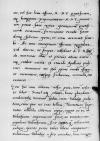
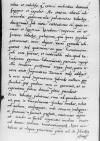

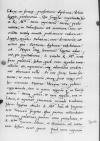
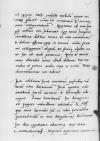
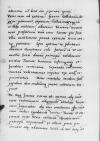


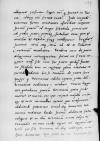


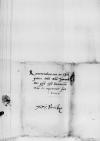
 BCz, 1597, p. 304
BCz, 1597, p. 304